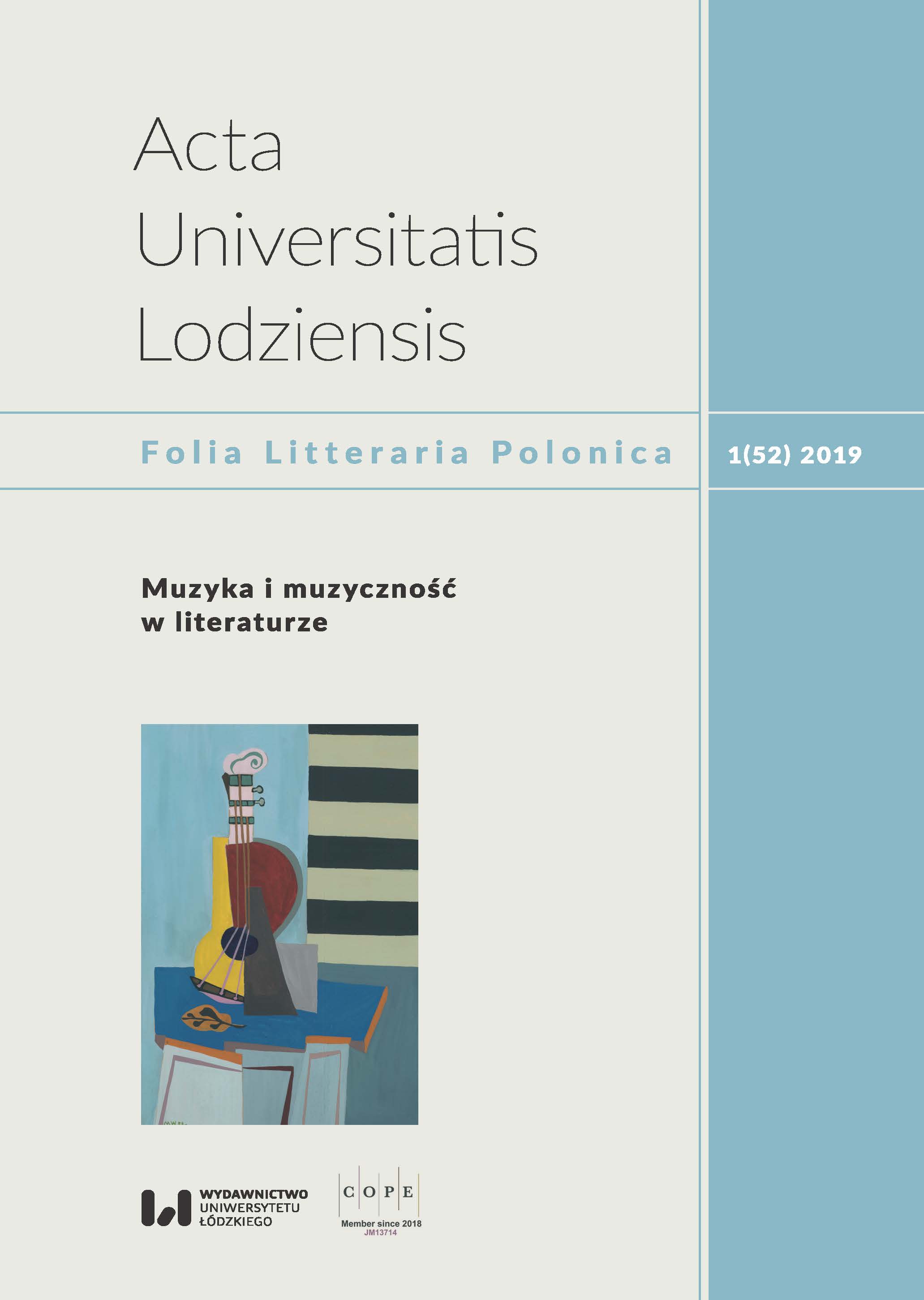From Baudelaire to Mallarmé. In search of the ideal of musicality
DOI:
https://doi.org/10.18778/1505-9057.52.16Keywords:
Musicality, Correspondences, French Symbolism, Ideal, SilenceAbstract
This article undertakes the topic of the evolution in perceiving the ideal of literary musicality among representatives of French symbolism, taking into account Baudelaire and Mallarmé. The former, who is considered to be the precursor of symbolism, used prosody and combined the arts and music to convey the metaphor of painting and poetry. On the other hand, in Mallarmé’s oeuvre, it is poetry that moves closer to music on the level of form. Next, the utilization of the acoustic aspect of text, which is characteristic of Verlaine, is degraded in René Ghil’s artificial system of verbal instrumentation. The work of Villiers de l’Isle Adam and Jules Laforgue shows that music-related topics are gradually set aside and the music theme is softened and gives way to silence. Silence itself is the best way that presents Mallarmé’s ideal of musicality as a silent concert that resonates in the reader’s mind.
Downloads
References
Albrecht Florent, L’objet musical chez Mallarmé, instrument des fuites, w: Mallarmé et la musique, la musique et Mallarmé, redakcja Antoine Bonnet, Pierre-Henry Frangne, Presses Universitaires de Rennes 2016, s. 79–96.
Google Scholar
Baudelaire Charles, Kwiaty zła, Państwowy Instytut Wydawniczy, Warszawa 1958.
Google Scholar
Baudelaire Charles, OEuvres complètes, ed. Yves Gérard Le Dantec, Claude Pichois, Gallimard, Paris 1961.
Google Scholar
Baudelaire Charles, Rozmaitości estetyczne, przekł. Joanna Guze, Słowo/obraz terytoria, Gdańsk 2000.
Google Scholar
Bernard Suzanne, Mallarmé et la musique, Librairie Nizet, Paris 1959.
Google Scholar
Buchs Arnaud, Une pensée du langage, w: Mallarmé et la musique, la musique et Mallarmé, redakcja Antoine Bonnet, Pierre-Henry Frangne, Presses Universitaires de Rennes 2016, s. 47–58.
Google Scholar
Dąbrowski Stanisław, „Muzyka w literaturze”. (Próba przeglądu zagadnień), w: Muzyka w literaturze. Antologia polskich studiów powojennych, redakcja Andrzej Hejmej, Universitas, Kraków 2002, s. 145–169.
Google Scholar
Estay Stange Verónica, Sens et musicalité. Les voix secrètes du symbolisme, Classiques Garnier, Paris 2014.
Google Scholar
Guze Joanna, Nieomylny Baudelaire, w: Charles Baudelaire, Rozmaitości estetyczne, przekł. Joanna Guze, Słowo/obraz terytoria, Gdańsk 2000, s. 5–16.
Google Scholar
Hejmej Andrzej, Muzyczność dzieła literackiego, Wydawnictwo Naukowe UMK, Toruń 2012.
Google Scholar
Hejmej Andrzej, Muzyka w literaturze. Perspektywy komparatystyki interdyscyplinarnej, Universitas, Kraków 2008,
Google Scholar
Lacoue-Labarthe Philippe, Musica Ficta (Figures de Wagner), Christian Bourgeois, Paris 1991.
Google Scholar
Mallarmé Stéphane, OEuvres complètes, ed. Henri Mondor et G.-Jean Aubry, Gallimard, Paris 1945.
Google Scholar
Mallarmé Stéphane, Rzut kośćmi nigdy nie zniesie przypadku, przekł. Tomasz Różycki, Korporacja Ha!art, Kraków 2005.
Google Scholar
Mallarmé Stéphane, Wybór poezji, redakcja Adam Ważyk, Państwowy Instytut Wydawniczy, Warszawa 1980.
Google Scholar
Markowski Michał Paweł, Nicość i czcionka. Wprowadzenie do lektury „Rzutu kośćmi” Stéphane’a Mallarmé, w: Stéphane Mallarmé, Rzut kośćmi nigdy nie zniesie przypadku, przekł. Tomasz Różycki, Korporacja Ha!art, Kraków 2005, s. 9–23.
Google Scholar
Sand George, Impressions et souvenirs, Michel Lévy Frères, Paris 1873.
Google Scholar
Starzyński Juliusz, O romantycznej syntezie sztuk. Delacroix, Chopin, Baudelaire, Państwowy Instytut Wydawniczy, Warszawa 1965.
Google Scholar
Śniedziewski Piotr, Mallarmé – Norwid. Milczenie i poetycki modernizm we Francji oraz w Polsce, Wydawnictwo Naukowe UAM, Poznań 2008.
Google Scholar
Tibi Laurence, La Lyre désenchantée. L’nstrument de musique et la voix humaine dans la littérature du XIXe siècle, Honoré Champion, Paris 2003.
Google Scholar
Woronow Ilona, Romantyczna idea korespondencji sztuk. Stendhal, Hoffmann, Baudelaire, Norwid, Wydawnictwo UJ, Kraków 2008.
Google Scholar
Zieziula Grzegorz, „Tannhäuser” Wagnera w Paryżu: zachwyt Baudelaire’a, śmiech Scuda i ironia Fiorentina, „Muzyka w Mieście”, 06/2013, s. 34–36.
Google Scholar
Downloads
Published
How to Cite
Issue
Section
License

This work is licensed under a Creative Commons Attribution-NonCommercial-NoDerivatives 4.0 International License.











